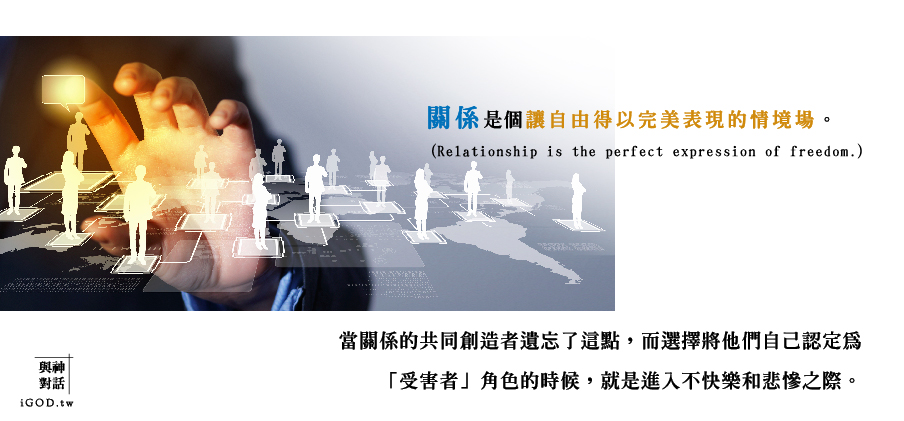
聽神談【「自由」與「關係 Relationship」】
自由並非什麼「可以局部是、局部不是」的東西。
它就像懷孕。你無法「有一點懷孕」。你也無法「有一點自由」。要嘛你自由,或要嘛你不自由。
(You cannot be a little pregnant. You also cannot be a little free. You either are free or you are not.)
尼爾:自由去做任何的事?
要嘛你自由,或要嘛你不自由。(Either you are free or you are not.)
尼爾:即使你沒有給我們這種自由。
哦,但我有給你們。
尼爾:是啊,只是如果我們用了自由,就招來懲罰。
不,我不會。
尼爾:嗯,配偶們會。
人類都這麼認為?
尼爾:只是認為嗎?他們是「經驗」過。
那麼,人類在他們的關係裡,沒有經驗到自由囉?
尼爾:沒有多少人有。
他們全都有。
尼爾:我不認為如此。當他們被「某人離開他們,使得他們的生活變得悲慘」所懲罰時,就沒有。當他們受到這懲罰,因為他們喜歡打高爾夫,或被工作困住,或不夠關注對方,或——願上帝不讓它發生——與另外某一個人體驗片刻以性表達的愛時,就沒有。
在新靈性的日子裡,人類將了解,他們在關係裡永遠有完全的自由,沒有人能將它拿走,因為那即「他們是誰」,而每個想怪罪別人削減一個人的自由的企圖,只不過是個「遺忘的行為」(every attempt to blame someone else for curtailing one’s freedom is simply an act of forgetfulness)。
關係是建立在完全的自由(total freedom)上的。這就是關係運作的方式。
尼爾:所以,當一個丈夫告訴妻子,如果她不對他付出足夠的關注,他將離開,難道這是自由嗎?在關係裡,妻子不應該也可以自由地做她自己嗎?
當然。如果那位丈夫告訴她,他在關係裡要某種分量的關注,否則他要離開,而妻子不給他那種分量的關注時,妻子是在做一個自由的選擇。
尼爾:但她要為那選擇受到懲罰。
所有的選擇都有後果。然而,後果並非懲罰,它們是結果(Outcomes are not punishments, they are results.)。
在關係裡,雙方都有自由去表達自己的喜好。這些宣告是表達「你是誰」的聲明。你的夥伴並不必須「同意」你是誰,你的夥伴只必須「留意」(notice)它。
舉例來說,如果你是個選擇不住在煙霧迷漫的環境裡的人,你有自由宣告那一點。你的配偶隨之有自由在家裡或不在家裡吸煙。你隨之有選擇留在家裡或離開的自由。
對於這種「對方的自由選擇」,任一方都不必覺得被冒犯,或容許自己被他們「傷害」。說你被別人自由意志的抉擇「深深傷害」,就是否定你與別人兩者真正是誰。那是個「遺忘的行為」。

關係是個讓自由得以完美表現的情境場(Relationship is the perfect expression of freedom.)。當關係的共同創造者遺忘了這點,而選擇將他們自己認定為「受害者」角色的時候,就是進入不快樂和悲慘之際。
摘自《 走出靈性文盲》第6章
Freedom is not something that can be partial. It is like pregnancy. You cannot be a little pregnant. You also cannot be a little free. You either are free or you are not.
Neale: Free to do anything?
Either you are free or you are not.
Neale: But even you have not given us that kind of freedom.
Oh, but I have.
Neale: Yes, but you punish us if we use it.
No, I do not.
Neale: Well, spouses do.
Do humans believe this?
Neale: Believe it? They experience it.
Then humans are not experiencing freedom in their relationships?
Neale: Not many.
They all are.
Neale: I don’t think so. Not when they get punished by someone leaving them, or making life miserable for them. Not when they receive this punishment because they enjoy golf, or are caught up in their work, or don’t pay the other enough attention, or, God forbid, experience a moment of love expressed sexually with someone else.
In the days of the New Spirituality humans will understand that they al- ways have total freedom in relationships, that no one can ever take that away from them because it is Who They Are, and that every attempt to blame someone else for curtailing one’s freedom is simply an act of forgetfulness.
Relationships are based on total freedom. That is how they work.
Neale: So when a husband tells a wife he’s going to be leaving if she doesn’t pay him enough attention, that’s freedom? The wife is supposed to feel free to be herself in the relationship?
Of course. If the husband told her that he wants a certain amount of attention in the relationship or he’s leaving, and the wife does not give him that amount of attention, she’s made a free choice.
Neale: But she gets punished for that choice.
All choices have outcomes. Yet outcomes are not punishments, they are results.
Both partners in a relationship have the freedom to state their preferences. These announcements are statements of Who You Are. You partner does not have to agree with Who You Are, your partner merely has to notice it.
If who you are is a person who does not choose to live in a smoke-filled environment, for example, you have the freedom to announce that. Your spouse then has the freedom to smoke or not smoke in the home. You then have the freedom to remain in the home or to leave.
Neither party need take offense at the free-will choices of the other, or allow themselves to be “hurt” by them. To say that you have been “deeply hurt” by the free-will choice of another is to deny who both you and the other really are. It is an act of forgetfulness.
Relationship is the perfect expression of freedom. Where the unhappiness and the misery comes in is when the co-creators of the relationship forget this, and choose to cast themselves in the role of “victim.”

